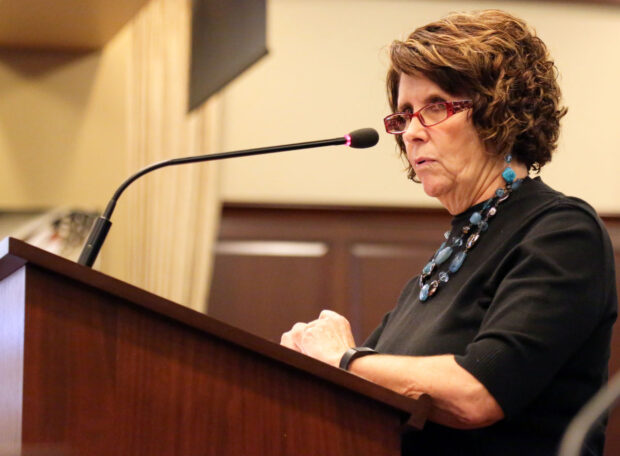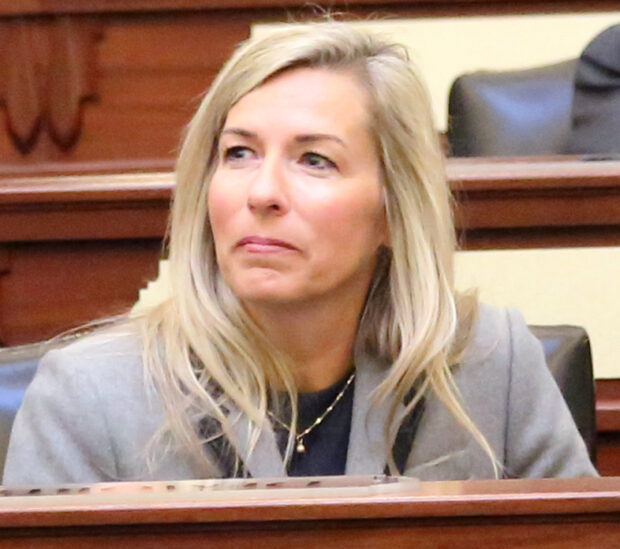A charter school bill ran into trouble Friday in the House Education Committee, after leaders of two of the state’s powerful education groups said they were not consulted on the proposal.

Idaho School Boards Association Executive Director Karen Echeverria even went as far as to say she felt charter school advocates deceived her.
After a lengthy and sometimes contentious hearing, House Education voted to hold the bill at the discretion of Chairwoman Julie VanOrden.
VanOrden, R-Pingree, wants to give ISBA and the Idaho Education Association’s leaders time to review the 16-page bill and consult with their members.
Several committee members recommended VanOrden bring the bill back for a vote Monday or Tuesday. Others said education groups should develop consensus over the coming months and bring back a transparent, well-vetted proposal in 2018.
It is unclear how Friday’s dustup affects the bill’s prospects. This week, lawmakers ramped up efforts to adjourn the legislative session March 24. House leaders are also pushing a Monday deadline to pass bills from one legislative chamber to the other.
Rep. Gayann DeMordaunt, R-Eagle, and Idaho Charter School Network lobbyist Emily McClure are pushing House Bill 241. Supporters say the bill is designed to streamline the charter school authorization process.

The bill removes six pages of law related to the petition to establish public charter schools. Supporters said the bill removes duplicative and burdensome requirements, but replaces most of the stricken language in other sections of code. The bill also compresses the timeline for creating new charter schools.
DeMordaunt is a founder of North Star Charter School, a school choice advocate and a former member of the Idaho Charter School Commission. DeMordaunt said the requirements for creating new charter schools can drag out over two years or more and threaten to stifle the school choice movement.
“The intent is not to reduce scrutiny or oversight of charter school authorization — we want high-quality schools of choice for our kids,” DeMordaunt said. “(Passing this bill) may mean school choice doesn’t wither on the vine here in Idaho as time chokes out the enthusiasm of parents and educators.”
Echeverria told the committee she asked to review the bill several times, but was not given a copy until late Tuesday. That meant Echeverria did not have time to review the bill or discuss its implications with her members before Friday’s hearing.
The bill would remove a requirement that charter school authorizers ensure a charter school “complies with the general education laws of the state unless specifically directed otherwise…” This was a point of contention Friday.
Echeverria said the ISBA was never invited to participate in negotiations, and was not told about the clause striking compliance with general education laws. Echeverria also suggested a second companion bill is in the works, but said she hasn’t been allowed to review that either.
“Whether it was intentional or not, we feel we were deceived,” Echeverria said.
McClure appeared taken aback, said she has never been in this position before and said she felt “terribly disheartened” to hear anyone felt misled.
McClure said charter advocates believed removing the compliance with general education laws was “ a housekeeping item.” She claimed there is no universal definition of general education laws and she did not want to force charter school leaders to comply with laws she could not explain.
McClure also said she wracked her brain and could not remember making any misleading statements, and said she would be really disappointed in herself if she had misled other lobbyists.
IEA attorney Paul Stark also said the statewide teachers union was cut out of discussions surrounding the bill, and did not receive a copy until 10:30 p.m. Tuesday. Calling the bill exceedingly complicated, Stark said nobody has been given the time to properly vet the bill and determine its effects.
Rapid fire: New K-12 bills emerge
Working in rapid succession Friday, the House Ways and Means Committee held its first meeting and introduced nine bills.
Six of the bills have a connection to K-12. Here are the highlights:
- One bill, also pushed by McClure, would give high-performing charter schools more flexibility in hiring. If charters meet student growth or proficiency goals, or received state renewal “without conditions,” they would have more latitude in hiring non-certified teachers.
- VanOrden presented a bill that would remove term limits for members of the state Public Charter School Commission. Charter school groups want the change, in order to allow experienced commission members to stay in place, VanOrden said. State law now limits commission members to two four-year terms.
- The State Board of Education introduced a slightly rewritten bill on student data and public records requests. The bill is similar to one that passed the Senate unanimously earlier in the session. While largely technical, the new bill makes one substantive change. The bill would prohibit the release of public records that, when combined with other records, would divulge data that identify individual students.
House Ways and Means meets irregularly — and when the committee convenes, it meets to consider new legislation late in the session.
Idaho Education News reporter Kevin Richert contributed to this report.
Disclosure: Idaho Education News reporter Clark Corbin chairs the Idaho Press Club’s First Amendment Committee, which opposes the State Board of Education’s public records bill. Corbin has recused himself from coverage of this bill.
